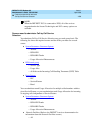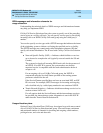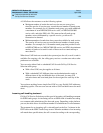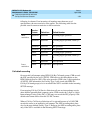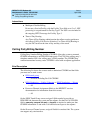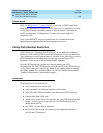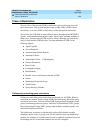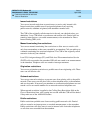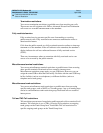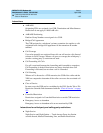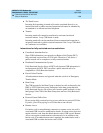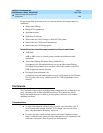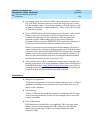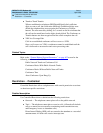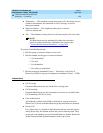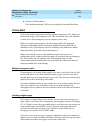
DEFINITY ECS Release 8.2
Administrator’s Guide
555-233-506
Issue 1
April 2000
Features and technical reference
1306Class of Restriction
20
Termination restrictions
You can use termination restrictions to prohibit users from receiving any calls.
These users can still originate calls. DID or Advanced Private-Line Termination
calls route to a recorded announcement or the attendant.
Fully restricted service
Fully restricted service prevents specific users from making or receiving
public-network calls. Fully-restricted users cannot use authorization codes to
deactivate this feature.
Calls from the public network to a fully-restricted extension redirect to intercept
treatment or to the attendant. If the call redirects to the attendant, the attendant’s
display indicates the call was redirected because of fully restricted service
(FULL).
There are circumstances where an extension with fully restricted service can
access or be accessed by the public network.
Miscellaneous terminal restrictions
You can use miscellaneous terminal restrictions to prohibit users from accessing
other specific terminals. Restricted calls are routed to intercept tone.
Miscellaneous restriction groups apply on a per-COR basis. However, you can
assign the same COR to more than one facility. Facilities with the same COR may
be like facilities (such as two telephones) or different facilities (such as a
telephone and a trunk group)
Miscellaneous trunk restrictions
You can use miscellaneous trunk restrictions to prohibit users from accessing
specific trunk groups, such as WATS or CO trunk groups. Any or all trunk groups
can be in a miscellaneous-trunk-restriction group. Restricted calls are routed to
intercept tone.
Toll and TAC-Toll restrictions
Toll restrictions prevent users from placing public-network calls to certain toll-call
numbers. Toll restriction is not a COR; you assign Toll restrictions to outgoing
trunk groups on the Trunk Group form. You disable TAC-toll restrictions for
specific outgoing trunk groups on the Trunk Group form.



